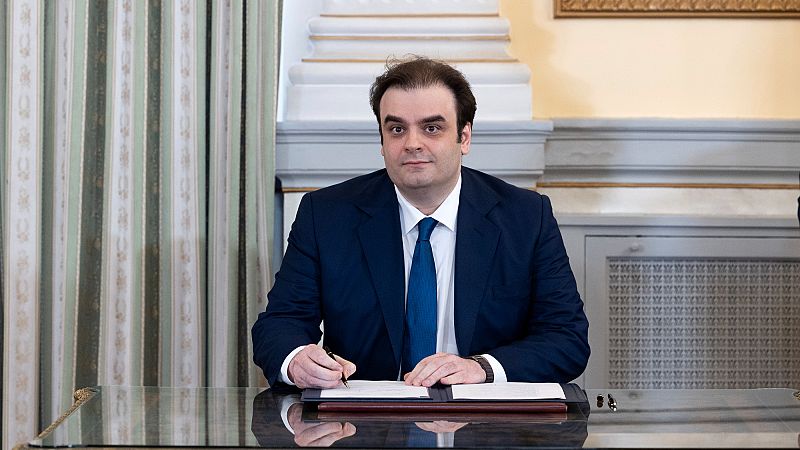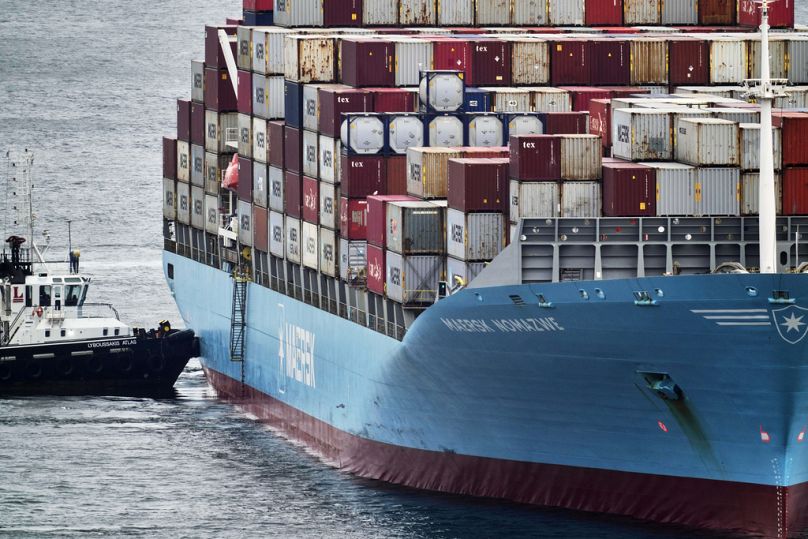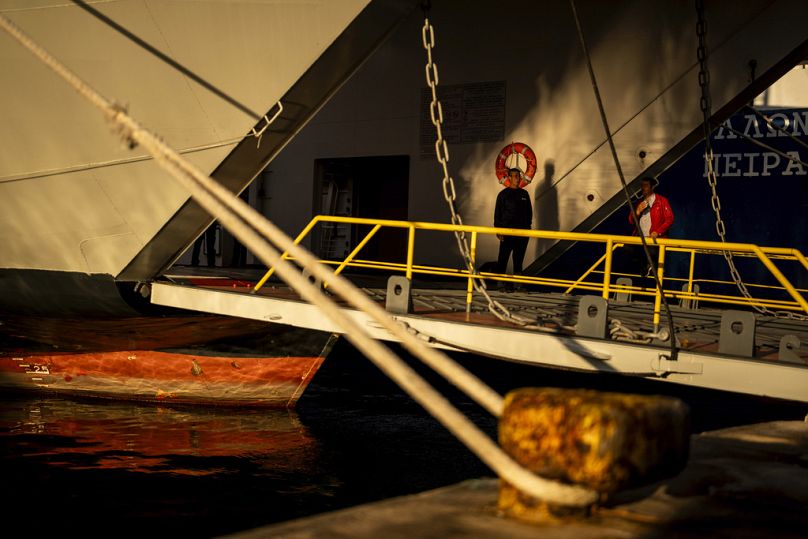
The Greek government appears hesitant and cautious in commenting on the EU-US trade deal on tariffs reached between Ursula von der Leyen and Donald Trump.
Greek Finance Minister Kyriakos Pierrakakis, speaking in the parliament, outlined the government's thoughts on this burning issue. He noted that it puts an end to months of uncertainty following Trump's election and the "back and forth" with the tariffs, and that is a positive thing.
He stressed, however, that the government is studying the agreement to see how it can better manage the problems that will arise in areas of Greece's commercial interest.
"The agreement puts an end to months of uncertainty regarding the status of perhaps the most important bilateral trade relationship in the global economy. It secures transatlantic unity and prevents a trade war with a chain of negative effects on international trade and on international distribution and production chains," Pierrakakis outlined.
"The agreement also strengthens the energy security of the European economy for the foreseeable future. From this perspective, the development is positive."
"As you know, as a matter of principle, Greece supports free trade based on stable rules. The agreement provides for the application of tariffs of 15% on European exports to the US, with some asterisks," Pierrakakis continued.
"Based on the principled position I have described to you, the Greek government would like a lower tariff rate, ideally zero for all transatlantic trade flows. On the other hand, the announced tariff rate is lower than what was scheduled to be applied on 1 August."
"The government is closely following the relevant consultations and, to the extent that the framework of the agreement will allow, possibilities will be explored that could help to better address issues related to products of particular interest to our country."
'Ending intra-European tariffs'
The Greek finance minister also raised another issue, which concerns Europe itself. He said there are still intra-EU barriers that act as tariffs and should be eliminated.
"If we really want a strong, competitive and single European economy, we have to tear down the last invisible walls that still prevent the free movement of goods and services within the Union," Pierrakakis said.
"It is not possible that, decades after the Single Market was established, there are still regulatory or administrative barriers that in practice act as intra-European 'tariffs'."
"In manufacturing there are equivalent internal tariffs of 45% and in services the equivalent is 110%. This is what the International Monetary Fund has documented, and Mario Draghi has mentioned it in his column," he explained.
"So, what needs to be conquered and achieved is to remove the barriers, especially between the European economies. And of course we as a country should also be able to systematically address more and more markets, such as India and the Middle Eastern markets, for our exports."

'A defining development'
The president of the Hellenic Chamber of Commerce and Industry, Yannis Bratakos noted that the agreement is a defining development for global trade as things are now more predictable. On the other hand, he stressed that it creates serious challenges for Greek and European production.
"The recent agreement between the United States and the European Union, which includes a new tariff framework, is a decisive development for transatlantic cooperation and the global economy," Bratakos said.
"The new tariff framework resulting from the agreement creates conditions of greater predictability, but at the same time incorporates challenges for specific sectors of European production."
Bratakos continued: "The exemption of strategic sectors, such as aeronautics, generic medicines, chemicals and certain agricultural goods, is a positive development."
"However, the imposition of uniform tariffs on high-value-added products - including pharmaceutical, industrial and agri-food exports - may hurt the competitiveness of companies that support critical shares of the Greek economy."
"Particular attention is needed to protect iconic Greek products, such as olive oil, feta and wines, which risk being burdened by the new regime. In this environment, the need for constant monitoring of developments and effective participation in the shaping of European decisions becomes crucial," Bratakos explained.
"At the same time, the strengthening of energy cooperation with the US, through increased imports of LNG and investment in infrastructure, opens up new opportunities for Greece, especially in the fields of logistics, shipbuilding and regional energy interconnection."
"The Athens Chamber of Commerce and Industry calls on the Greek government to ensure, within the framework of the European institutions, that the final implementation of the agreement will not disrupt the competitiveness of Greek exports and will not increase the dependence of specific sectors on third markets."
"It is time for our country to invest concretely and more actively in interconnection with the US and at the same time to broaden its export prospects to alternative markets. The Hellenic Business Association (EBEA) will continue to support this national effort with informed interventions, services to its members and the continuous promotion of Greek entrepreneurship abroad".
Hopes of 'manageable' situation
The port of Piraeus is a very large trade hub, the main seaport of Athens and plays a key role in the commercial and industrial traffic of Greece and Europe.
"We want to believe that the agreement to impose tariffs at the 15% level is a manageable situation and we hope that it will not create losses in US-EU bilateral trade," President of the Piraeus Chamber of Commerce and Industry, Vassilis Korkidis said.

"In international trade, any agreement is always better than no agreement and the unilateral imposition of measures and countermeasures. The fact that it was agreed to impose a 15% general tariff on all products including cars is an element that restores balance to US-European trade relations and seems to satisfy both parties," Korkidis explained.
"However, the tariffs on steel and aluminium remain at 50%, and it is not clear whether pharmaceuticals and semiconductors will eventually be subject to separate tariffs."
"The agreement also provides that the EU will buy US military equipment and energy worth a total of $750 billion, while making significant investments of $600 billion."
"The European side calls it an 'all-inclusive' trade agreement between the two major trading partners that brings stability. Regardless of the details and exceptions, it is significant that after months of negotiations, the agreement was reached less than a week before the August 1 deadline and the imposition of higher tariffs that would have had serious repercussions," he said.
"We want to believe that the agreement to impose tariffs at the 15% level is a manageable situation and we hope that it will not create losses in US-EU bilateral trade," Korkidis concluded.







